Peter MALONE
Saturday, 09 October 2021 13:02
Rolling to You/ Tout le Monde Debout
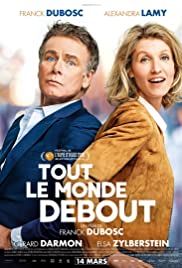
ROLLING TO YOU/TOUT LE MONDE DEBOUT
France, 2018, 105 minutes, Colour.
Frank Dubosc, Alexandra Lamy, Elsa Zylberstein, Gerard Darmon, Caroline Anglade, Claude Brasseur.
Directed by Frank Dubosc.
This is a romantic comedy written and directed by Frank Dubosc who also takes the central role. It is a variation on the romantic comedy in so far as the leading lady has had an accident and is in a wheelchair, the leading man is seen in a wheelchair and presumed disabled, falls in love, maintains the fiction.
Frank Dubosc plays the character breezily, a joker, a con man, yet a successful businessman, smitten by Florence (Alexandra Lamy), encountering her as a violinist, as a tennis player, contriving to attend her concert in Prague, taking her to dinner, falling evermore in love and unable to tell the truth. She falls in love with him.
She is an astute person and has realised the truth but leads Jocelyn on. He meanwhile tries to get advice from his business partner and his brother. The brother tells Florence’s sister who had made the first encounter with Jocelyn and told her sister. There are also problems with Jocelyn’s secretary of 12 years who feels overlooked.
There is a surprise towards the end when Lourdes is considered as the solution, Jocelyn being still unable to stand. However, there is a very sensible scene with a local priest and Jocelyn, the priest noticing his worn shoes and realising he is pretending, talking to him about pilgrimages to Lourdes and faith and warning him not to scandalise or dissolution the faithful.
The way that Jocelyn is unmasked is a surprise. And the solution, Jocelyn running in a marathon and collapsing with Florence to the rescue finishes with a nice touch.
(Some bloggers took the film very seriously and were upset by what seems to be some mockery of the disabled.)
1. Romantic comedy? With a difference? The treatment of men and women with disabilities?
2. The Paris settings, marathon training, the city scenery? Episodes in Prague and the beauty of the city? Offices, meetings, the media, opera, restaurants…? The musical score, performance, songs?
3. The introduction to Jocelyn, at the airport, his telling stories, embroidering the stories, the comic touches? Meeting Max at the airport, friend, advice, business associate?
4. Jocelyn and his brother, being late for the funeral, the long eulogy by the priest, focusing on the mother – and her glamour and style? Jocelyn later going to visit his father, the father not coming to the funeral, in the home, their talk, his father’s jokes, Jocelyn supporting him?
5. Jocelyn going through his mother’s things, sitting in the wheelchair, Juliet arriving, taken aback, her being a social carer, mentioning this to her sister, the sister’s accident, her being in a wheelchair?
6. Florence, the accident, disability, cheerful personality, talking with Julie, the information about Jocelyn, his disability? Jocelyn meeting her, the attraction? In the wheelchair? His watching her play tennis? The plans for his business, sneakers and shoes (like Kill Bill)? Sponsoring games? His office, Marie as his secretary, 12 years, feeling she was not noticed, his birthday gift, the gizmo? His sitting on the desk? Going to the tennis, his story about the wheelchair stolen?
7. Florence, the violin, the concert in Prague, Jocelyn having to sign the contract, going to the performance, in the wheelchair? Waiting for Florence, going to the restaurant, the dinner, the Italian song? To her hotel, his leaving?
8. The problems of his lie, the advice from Max, telling his brother, the return to Paris, the meal, sinking into the water, the sexual encounter, the aftermath?
9. The brother telling Julie, her talking to Florence, Florence realising the truth initially, letting Jocelyn play along? Jocelyn, his inability to tell the truth?
10. The brainwave about going to Lourdes, a cure and miracle, the group actually going? The priests, seeing Jocelyn’s used shoes, knowing he was a fake, the sensible talk about cures, rarity, the visit to Lourdes for faith and renewal of faith, urging Jocelyn not to disillusion people?
11. The aftermath, his desperation, Florence on the road, the approaching truck, Jocelyn standing and pulling her to safety?
12. The marathon, his running, collapsing, Florence coming with the chair, his sitting on the chair – and happy reconciliation?
Published in Movie Reviews
Published in
Movie Reviews
Saturday, 09 October 2021 13:02
Dead Silence/ 1997
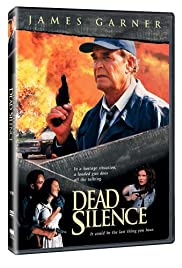
DEAD SILENCE
US, 1997, 105 minutes, Colour.
James Garner, Kim Coates, Marlee Matlin, Lolita Davidovich, Charles Martin Smith, Kenneth Welsh, James Billmaire, Gary Basaraba, Scott Speedman, Barry Pepper.
Directed by Donald Petrie Jr.
This is a film version of a novel by Jeffrey Deaver (whose The Bone Collector was film with Denzel Washington than Geneva Angelina Jolie).
This is a siege and hostage film, familiar material, but with a difference that the hostages are profoundly deaf children with a teacher and a bus driver. The criminals are reckless, led by Kim Coates who has shown himself an expert at being the villain.
The film is strong in suspense, showing the hours passing, the techniques of the negotiator, a very strong James Garner who has had difficulties in his past in a former siege. The supporting cast includes Marlee Matlin as the deaf teacher who takes initiatives in getting the children free, Kenneth Welsh as the local sheriff, Charles Martin Smith as a state authority who interferes, Lolita Davidovich as a negotiator. The characterisations are strong. Audiences are carried by the usual conventions of demands, phone negotiations, threats, the killing of a hostage, bluff and waiting for the criminals to give in.
As with all Jeffrey Deaver stories, just when you think all settled, there is a plot twist.
1. Police thriller? FBI? Deaf children as hostages? Prison escapees?
2. The setting in New York State, the roads, the crash, the countryside, the old abattoir, interiors, the surroundings? The FBI headquarters? The musical score?
3. The title, the deaf and mute children, hostages, their ordeal, the escape? The bus driver, Melanie, the teacher, able to read lips? Added tension to a more familiar hostage situation?
4. The background of the escapees, the crash, shooting the other drivers, taking the school bus, going to the abattoir, holding the hostages, the threats, shooting the bus driver, their background stories, robbery, murder, rape?
5. John Potter, the strength of James Garner’s screen presence, strategies, intuitions? The footage about his previous case, the disaster, the death of his wife, the television coverage? The reaction of the local police? Hostility? Collaboration? His being strong-minded, rejecting some of the police, asserting authority, the encounter with the state’s attorney, threatening him, taking him in? The demands, the young officer throwing the phone, communication? Style of talking with Ted? The pizza? The helicopter? The device of the bulldozer?
6. The hours passing and signalled on screen, the tension for the children, the fear, hustled from the bus, upstairs, the petrol on the floor, the lamp? The defiant girl? Tied up? Brought to the window? The girl tied up, Sonny and his reputation, the threat of rape?
7. The three criminals, their escape, Ted in charge, Sonny and his vigilance, looking out the window, not seeing Melanie and the children escape? His sexual behaviour? His denials? Ted shooting him in the groin?
8. The New York State official, asserting authority, rejected by Potter, going to negotiate, shots fired, his being dragged away, threatened by Potter, yet his having media attention?
9. The day progressing, Lenny, the local sheriff, initial disagreement, working with Potter? Getting the bulldozer, driving it, destroying the engine, a diversion for the criminals to watch?
10. Melanie, initiatives, discovering the back stairs and the pipe to the river? Signalling at the window? Potter disagreeing with her, but not able to change? His later agreement?
11. Melanie, the details of the discovery, her caution on the stairs? Rounding up the children, their following her, into the pipe? The Coast Guard? Rescuing the children? Ted and his discovery, taking Melanie and the girl, firing the shots?
12. The scene in the water, the rapids, the boats, the boat overturning, the young boy, the Coast Guard saving him? Reunited with their families?
13. The information about the previous dealer with hostages, Sharon Foster, her arrival, tough stands, expertise on the phone, the long night, waking them out, Ted giving in and phoning, persuading Ted and his associate to come out, their being taken? In the van, Sharon Foster getting a lift?
14. The twist in the plot, the real Sharon Foster found dead, the girlfriend working with Ted, back to the abattoir to get the money, the revelation of Marx as the villain, his demands, Ted shooting him? Potter wounded?
15. Ted, the getaway, shooting his girlfriend? Melanie, locking the car, the gun, back into the abattoir, the confrontation with Potter, Ten’s death?
16. A satisfying hostage thriller?
Published in Movie Reviews
Published in
Movie Reviews
Saturday, 09 October 2021 13:02
Terra de Abbastanza/ Boys Cry
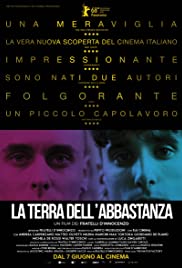
LA TERRA DI ABBASTANZA/ BOYS CRY
Italy, 2018, 95 minutes, Colour.
Andrea Carpenzano, Matteo Olivetti, Milena Mancini, Luca Zingaretti.
Directed by Damiano D' Innocenzo, Fabio D' Innocenzo.
This film is tough viewing. It is in the 21st-century tradition of strong, sometimes graphic films about gangsters on the outskirts of Italian cities. The English title does not relate it all to the ironic Italian title which means the land of enough. And the question, when is enough enough?
The film focuses on two boys, studying, getting jobs delivering fast food, some vague prospects about their future life, working in a bar, chef…
However, they knock down a pedestrian and he is killed, they drive off, one of the boys having some scruple, Mirko. However, his friend, Manolo, takes them to see his father who offers to handle the situation, discovering that the man knocked down was actually a police informer and that his death is something of a service to the local gangsters. When the son agrees to become a hitman for the gangsters, eventually reveals this to his friend who then agrees. They are completely amoral – as one of the subtitles says “they don’t give a fuck about anything�.
They enjoy their work, proud of it, getting money, Mirko clashing with his mother who is ill, has a boyfriend and is looking after the little girl. The gangsters assign them a big hit but are prepared to get rid of them afterwards. The hit goes awry, has an effect on Mirko who, at the end of the film, after leaving money for his mother, is seen walking towards the police station when he is knocked down by a car – an accident or the gangsters getting rid of him?
A strongly depressing film about contemporary young people and amorality.
1. The title, The Land of Enough? Irony? And ineffectual English title?
2. The settings, the suburbs, ordinary Italian life, students, home life, background of gangs, violence, extortion? The musical score?
3. Introducing Manolo and Mirkoo, in the car, eating, chatting, their work, jobs, studies, home life? Prospects? Their age?
4. The suddenness of the accident, Mirko and his hesitation, driving on, Manolo and his urging him on, the decision to go to Manolo’s father, his help? Life resuming his normal? Mirko and the tension with his mother, her health, her teeth, her boyfriend, the daughter, her care for her?
5. Manolo’s father, finding out who the victim was, going to the games, ingratiating himself, Manolo becoming part of the gang, avoiding classes, the encounter with Mirko, Manolo telling the truth, suggesting Mirko become involved, Mirko’s willingness?
6. The change of life, not caring about anyone or anything, the money, meeting the bosses, getting the commissions, the first killing, in the shop, Mirko making sure the victim was dead? Going shopping, extravagance, gifts for his mother? Her querying them? The clashes, Mirko moving out? His coming to the birthday party, all the gifts for the little girl, his mother’s reaction?
7. The continued career as killers? No moral foundation? The mother and her suspicion about the money?
8. The buildup to the final hit, the discussions amongst the gangsters themselves, the young men as disposable after the job, talking them at the dinner table, the commission?
9. The job, the irony of the victim shooting Manolo and Manolo killing the victim? The effect on Mirko? Upset? Talking with his mother? Leaving the money for her?
10. His walking tour to the police station, his being knocked down by the car, an accident, or deliberately killed?
11. A moral fable about contemporary amorality amongst the young?
Published in Movie Reviews
Published in
Movie Reviews
Saturday, 09 October 2021 13:02
Much Loved
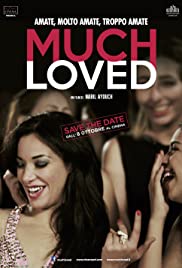
MUCH LOVED
Morocco, 2015, 104 minutes, Colour.
Loubna Abidar, Asmaa Lazrak.
Directed by Nabil Ayouch.
This is a fiction, with elements of documentary about a group of prostitutes in Marrakesh. It is directed by Nabil Ayouch, born in France but living in Casablanca, contributing to Moroccan filmmaking and perspectives on Moroccan life.
The film was screened in Cannes and won a number of awards around the world.
The first part of the film shows the women, living in a commune, driven by their chauffeur, getting ready for their work, their dress (and getting a meal), the woman supervising them at the club. There is a great amount of detail of the women, their interactions with the men, a focus on the men and their attitudes, behaviour, local men and with some comments about men from Saudi Arabia.
After this introduction, the film moves back to the house, and begins to outline the characters, the backgrounds of their lives, their attitudes towards their work, money and survival. One woman goes back to her home, criticised by her mother, ignored by her daughter. Another has a friend with whom she has physical relationships, perhaps loving him, he more than a touch brutal as well. Another is transgender. When one of the women is brutally bashed, they go to the doctor, encountering another young woman who claims she is there because she is pregnant. However, her back life is outlined, escape from the village, living on the streets. She is welcomed as part of the group.
The film continues with various experiences of women, the way they are treated by men, the presumptions of the men that they are merely playthings or women who can be treated at whim, and violently. This is the case with one man who has gay porn on his computer, seems impotent in his encounters, becomes brutal, taunts the prostitute defending himself.
Ultimately, the women decide to go on a holiday, taking their chauffeur and dressing him up, going to a fashionable hotel and resort, enjoying their time on the beach.
The film is non-judgemental about the women, depicting the realities of women who have to make a decision to spend their lives as prostitutes. The film is judgemental about the men that they service.
For non-Moroccan audiences, for audiences from non--Islamic countries, this film may be an eye-opener about sexual mores.
Published in Movie Reviews
Published in
Movie Reviews
Saturday, 09 October 2021 13:02
Someone has to Die/ Alguien tiene que morir
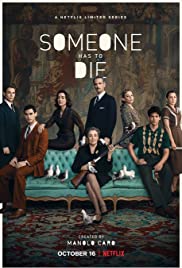
SOMEONE HAS TO DIE/ Alguien tiene que morir
Mexico/Spain, 2020, 149 minutes, Colour.
Cecilia Suarez, Ernesto Alterio, Alejandro Speitzer, Isaac Hernandez, Ester Exposito, Carlos Cuevas, Carmen Maura.
Directed by Manolo Caro.
Appearing on Netflix, this film was divided into 3x50 minute sections, presenting it as a miniseries.
While the film is basically Mexican, it is set in Spain in the last years of Franco’s regime. It does highlight class distinctions in Spanish society – and also the snobbery of Spaniards towards the colonial Mexicans.
The tone is quite Hispanic, melodramatic, even operatic, especially in its culmination. This may be too much for some sensibilities but, allowing for cultural styles, the film has much going for it.
The film focuses on a family. The son has spent 10 years in Mexico, from the time he was a little boy, and has now returned to Madrid, accompanied by a Mexican friend who is a successful ballet dancer. The father, a successful businessman, doing deals with intrigue, intends his son to get his life in order and become a businessman like himself. The father is also dominating of his wife, quite brutal, especially in sexual encounters. His mother is very glad to see her son and also welcomes the dancer.
For a complication, the grandmother also lives in the house. She is an extraordinarily strong and dominating personality, her husband having died 10 years earlier in a shooting accident. She is played by Spanish actress, Carmen Maura, notable in Spanish films over the decades, especially in filmed by Pedro Almodovar.
There is a surprising episode at the beginning of the film, women working in a prison like factory, 14 hour shifts, all lined up and harangued by a priest, especially condemning two women for their lesbian relationship. This introduces the same-sex theme. Many presume that the son returning from Mexico is in a relationship with the dancer. Gossip goes around, homosexuality is legislated against and homosexuals should be reported to the government – where they are interned, tortured to get further names.
Meanwhile, the focus is also on another family, and the occasion of shooting competitions, pigeons, their wings clipped, released and shot. There are official competitions, highly social events. One of the champions, from the other family, is a literally buttoned up, suit and tie, businessman, playing football, macho, but, it is clear, about his closeted sexual orientation and his attraction towards the friend coming back from Spain. There is a past.
At some stages, concerning relationships, there are some comedies of errors. There is a lot of gossip, jealousy, manipulation, cover-up. However, ultimately, there are some tragedies of errors, the father denouncing and imprisoning his son, the fact that the dancer is heterosexual and is attracted towards his friend’s mother, the sister intended for marriage to the son coming back from Mexico, gossiping, drawing false conclusions, malicious.
And, there is the truth about the grandmother, her husband, her hold on her son, her manipulation of a household servant whose communist husband is in jail, destroying documents…
The climax, with rifles and guns, involves all the central characters, confrontations, deaths, pathos – and a critique of self-involved families, consequences of repressive homophobia and sexual legislation, a retrospective on the strictness of the Franco regime.
1. A Mexican/Spanish production, the Hispanic sensibility, melodramatic, operatic?
2. Spain, the 1970s, the last years of Franco’s regime? Strict and repressive? Different classes in Spain, society, looking down on the poor? And looking down on Mexican colonials?
3. Madrid, the city, the streets and buildings, offices, prisons and factories, homes? The musical score?
4. The broadcast is three episodes in a miniseries? Yet a 150 minute film?
5. The sequence with the women, setting a tone for the film, strict morality, religious dimensions, same-sex attraction and behaviour, the women assembled, the religious harangue and condemnation by the priest, the officials and their offices? The plans for the institution, 14 hour shifts, the oppression of the women, the financial deals, for management?
6. The establishing of the family, the initial setting of the shooting competition, Alonzo and his superiority, suit and tie, his sister and her taunting, the family pride? An establishment activity? Shooting, the birds, clipping their wings, their being shot? The later return to this theme, expectations of members of the family, competitions, winning, reputation, celebrations afterwards?
7. Gregorio, businessman, the deals concerning the factories, his wanting his son to work there? His return home, his disdainful treatment of his wife, the brutal sexual encounter? His mother in the house, a dominant presence? His wife, from Mexico, his despising Mexicans, her loneliness in the house? The joy of the return of her son from Mexico
after 10 years?
8. Rosario, the maid in the house, her working with the mistress, treatment by the grandmother, her husband, Communist, in prison, her son’s visit, her dread of being reported as the wife of a Communist, the documents, wanting the support of her mistress, yet the pressure from the grandmother, Rosario betraying her mistress, taking the key, giving it to the grandmother? The grandmother tearing up the document about her husband? Her wanting her husband removed and not sent to the harsh prison, the visit of the son, the news that her husband had died? Her betrayal and futility?
9. Gabino, 10 years in Mexico, a sense of freedom, his being accompanied by Lazzaro, the ballet dancer, his family glad to see him, his father’s expectations, the grandmother and the sinister memories, his having witnessed the killing her husband, going to Mexico, the memories of the child? Lazzaro welcomed into the house?
10. The rumours about sexuality? The introduction of the theme? The repressive laws in the Franco regime? Reporting and denunciation, arrests, torture for information? Homophobia, not understanding same-sex relationships? The irony of Lazzaro not being homosexual, Gabino being homosexually oriented, Alonso and his suppression, Cayetana, her attitudes, spreading gossip, Alonso and his homophobic friends?
11. The reality of orientations and relationships? Gabino and his advance to Lazzaro? Lazzaro and his attraction towards Gabino’s mother, the intimacy? The reconciliation between the two men, observed by Cayetana and her telling her father? Gregorio and his unwillingness to believe it? Making demands on Gabino to take the job? The interview with Alonso, and the memories of the past encounter?
12. Alonso, in the closet, the shooting, his friends, rugged playing football, the shower sequence and the innuendo? His moments of denial with Gabino?
13. Gabino, denounced by his father, taken to watch the torturing of the gay man and to get information, his being put in the same cell, the tortured man and his asking to be no to seek out his lover? Gabino released from jail?
14. Gabino, taken by Alonso and his friends, beaten? The plan to leave, the train to Paris, his mother getting the tickets, at the station, the arrival of the police, Gabino arrested, Lazzaro escaping?
15. Lazzaro, hiding out, wanting to help Gabino, the encounter with Mina, the motivation behind the helpful woman inviting everyone to come into the bush, the sexual encounter
between Lazzaro and Mina? The consequences?
16. Alonso wanting to help Gabino, coming with the gun, sitting in the car, asking about loving a man, Gabino and his narrative about the boy when they were young, Alonso’s tears, thinking to kill himself? Gabino’s restraint?
17. The role of the grandmother, a strong personality, dominance, snobbery, despising Mina, controlling her son, the sequence of her narrating her husband’s murder? Her reputation and her speech to the assembled women for the competition?
18. Gregorio, tormented, the letter about his mother and the murder, his attacking her?
19. The motif throughout the film of the spotlight on each of the characters, as if that were targets? That someone must die?
20. The finale, operatic, the confrontations, the guns, the wounding then killing of Lazzaro? The grandmother, Gregorio’s death, confronting her grandson, Alonzo and the gun, his being shot? Gabino confronting his grandmother, shooting her?
21. Gabino left with his mother? Their grief? The future and the future of Spain?
Published in Movie Reviews
Published in
Movie Reviews
Saturday, 09 October 2021 13:02
Anna and the Apocalypse
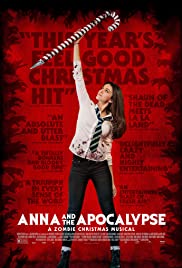
ANNA AND THE APOCALYPSE
UK, 2017, 93 minutes, Colour.
Ella Hunt, Malcolm Cumming, Sarah Swire, Christopher Leveaux, Marli Siu, Ben Wiggins, Mark Benton, Paul Kaye.
Directed by John McPhail?.
This is a British zombie Apocalypse story. It is in the tradition of Shaun of the Dead, what might be called a juvenile version, but it is also a musical, quite a number of songs throughout the film, similar in style and lyrics. When released in Britain, the film had some favourable response, especially from younger audiences. Older audiences and more critical audiences might find it rather trying.
The zombies do not appear until almost half an hour into the film. In the meantime we are introduced to Anna, an enterprising and cheerful young student, coming to the end of high school. It is she who introduces the songs, bursting out, surprisingly, at first, but then continuing with the singing, joined by her friend, John, another girl from school who has problems, Steph, another friendly young man – and, finally, the smug young man whom this group dislikes.
Which means then that throughout the film, including the scenes with the zombies, this is a high school musical show, self-assertion, relationships, falling out, along with sequences of Anna’s father, Mark Benton, who works in the school, and the comic figure of the school principal, Paul Kaye, his dominating, manic intolerance, wanting to save his school.
And, then there are the zombies, not many of them in the small town, but enough to cause disruption, give rise to familiar scenes of menace, pursuit of the healthy, and the fight back and deaths, so to speak, of the zombies. It is material that has become familiar, all the variations on stories of the living dead.
The film builds to a culmination, the students defending themselves, Anna’s father sacrificing himself (after singing), a dastardly death for the school principal. And, some of the central group also succumbing to the zombies, leaving a few to find a car and drive away to…?
Sad to note that the principal writer, Ryan Mc Henry, Scotsman who produced Be Musical, died at the time of release at the age of 27 and the film is dedicated to him.
Apparently, an entertainment for younger audiences, but for others…?
Published in Movie Reviews
Published in
Movie Reviews
Saturday, 09 October 2021 13:02
Rebeccca/ 2020

REBECCA
UK, 2020, 121 minutes, Colour.
Lily James, Armie Hammer, Kristin Scott Thomas, Sam Riley, Tom Goodman- Hill, Briony Miller, Keeley Hawes, Jane Laportaire, Bill Paterson.
Directed by Ben Wheatley.
Rebecca is probably the most celebrated of Daphne du Maurier’s novels – a number of which were filmed: Jamaica Inn, My Cousin Rachel, The Birds. The first film version, by Alfred Hitchcock, won the Academy Award for the Best Film of 1940. It starred Laurence Olivier and Joan Fontaine as the central couple and Judith Anderson memorable as the housekeeper, sinister, Mrs Danvers.
It is always a risk to go back to the source material of a celebrated film. There had been two television versions of Rebecca. This present version was financed by Netflix.
Perhaps unsurprisingly, many of the immediate comments were very unfavourable, disappointed in the rendition of the novel, making comparisons with Hitchcock’s film, derogatory remarks about Lily James and Armie Hammer (although praised by many others) but a consensus about the striking performance by Kristin Scott Thomas as Mrs Danvers.
The setting is the 1930s, opening in Monte Carlo, wealthy society, class distinctions, and a snobby American matron played by Ann Dowd with Lily James as her maid and companion. She attracts the attention of British widower, Maxim de Winter, Armie Hammer. There is romance – and some sexual behaviour, more 21st century 20th century, and the two are married.
Rebecca is the name of Maxim de Winter’s first wife, now dead, hallowed in the memory of many people in the ways she is talked about, put on a pedestal by Mrs Danvers who had cared for her since she was a child, not talked about by her husband. Lily James’s character has no personal name but is the second Mrs de Winter.
The setting is Manderley in Cornwall, the vast property, mansion, grounds, going to cliffs and down to the beach and sea. Everything is seen from the perspective of the second Mrs de Winter. She has led a fairly sheltered life before travelling with the American, comes from a family of moderate means, is not savvy in this Manderley world. She is awkward in managing, is dependent in her learning, is curious, makes mistakes, and experiences the severity of Mrs Danvers’ memories of Rebecca and her treatment of the new wife. Busy about many things and business, her husband tends to neglect her.
A key event is the preparation of the traditional ball and Mrs Danvers getting her revenge, promising to help, advising the new young maid to suggest a dress for the wife – which is a disaster because, when the young woman comes down to the ball, everybody is aghast because that dress was one of the features for Rebecca’s presence.
In many ways, complications are resolved but further complications arise when the boat carrying Rebecca when she drowned comes ashore – revelations about Rebecca’s life, a visit to a doctor, a visit from a cousin who has had an affair with her (Sam Riley), suspicions that Max had murdered his wife. It is here that the young new wife comes into her own, rising to the occasion, taking initiatives, checking out information about Rebecca and visiting the doctor.
There is quite a melodramatic ending, melodramatically satisfying, involving fire and a climax with Mrs Danvers.
For those who have not read the book or seen the Hitchcock film, probably an enjoyable two hours of romance and melodrama. And, perhaps enjoyable, for those who try to avoid comparisons with the past.
1. The popularity of Daphne du Maurier’s novel? 80 years since Hitchcock’s Oscar-winning film? The timeliness of a new cinema interpretation?
2. The initial setting is in Monte Carlo, the 1930s, the lavish buildings, streets, interiors? The Mediterranean coast? The contrast with Cornwall, Manderley, the approach to the building, the facade, the lavish interiors? The hut on the sea? The ocean, the coast, the beach, the cliffs? The musical score?
3. The title? The dead Mrs de Winter? A presence despite her death, idealised, her reputation, the reality? The second Mrs de Winter, no personal name?
4. The young woman, in service, the dominating American, class distinctions, snobbery? Bribing the concierge? Max seeing her, his invitations to her, her initial reluctance, enjoying his company, the notes, the variety of meetings, outings, driving, letting her drive, the swim? Her lack of experience, lack of travel, a lack of savvy? Her boss, currying favour with Max, yet putting the young woman down? The saying goodbye to Max, his decision, marrying, the honeymoon, the return to England?
5. The framework, the opening lines of the novel, her memories, the strange experiences? The reprise at the end?
6. The arrival, the servants all out in front, her awkwardness, not used to dealing with a mansion, a household of servants, protocols and decorum? Frank and his friendly welcome? The butler and his supercilious approach? The range of servants, the young man and his standing on guard, Clarice, personal maid, the friendly approaches and the young woman’s reliance on her? Max asking Mrs Danvers to take on the tour of the house?
7. Mrs Danvers, Kristin Scott Thomas, her screen presence, her look, communicating and judgemental attitude? Her clothes, decorum? Her work in the house, the emerging information about Rebecca, her guarding her as a child, her growing up, coming to Manderley, allowing her to live a free life? The continued innuendo? Condemnation of the new wife?
8. Maxim, Armie Hammer and his screen personality, the attraction towards the young woman, the outings, the effect on him? No information about Rebecca? Reticence, the audience judgement on him?
9. At home, love for his wife, the intimacy? The contrast with his being busy, the estate? Going for walks, his not wanting her on the beach, discovering the hut, sending Frank to lock the hut? The young woman, the discovery of the man in the house? The pursuit of the dog, the rope?
10. The new wife trying to manage, wandering the house, curiosity, Rebecca’s rooms, searching her drawers for information, fashions in London? Her breaking the pottery – and
later held to account?
11. Max and his absences, further information about Rebecca? Her cupboards? The scene with the nightgown and Mrs Danvers and the young woman feeling the texture?
12. The decision about the ball? Max wary? The friendly visit of Max’s sister and her husband, his gaffes? The grandmother and her declaring this was not Max’s wife? The later held that the ball by Max’s sister, her kindness towards Rebecca?
13. Jack, the man about town, his visit, to Mrs Danvers, his cousin, the secrecy from Max, self-assured, taking the young woman for her first ride on a horse? The later revelations about him, the affair with Rebecca?
14. Preparing for the ball, the dress, Clarice and her advice, the dress like the portrait, the young woman coming down, everybody aghast, Max’s reaction, her hurrying to her room, the sister in law and her encouraging her to come down? Her coming down, mingling with the guests? Awkward in the servants’ quarters and warned away?
15. The bedroom, Max and his apology?
16. The decision to give notice to Mrs Danvers, their discussions, the appeal for help – and Mrs Danvers’ revenge with the dress and the humiliation?
17. The boat, the rescue, the discovery of Rebecca’s body in the boat, the holes in the boat? The issue of the previous body identified by Max as his wife?
18. The shift of atmosphere, the police and the investigation, Jack and his presence and taunts, the attempt to extort money from Max? Suspicions on Max? Max, the discussions with his wife, the issue of the gun, his wanting her to shoot him?
19. The young woman, finding courage and conviction, going to London, the address of the doctor, getting in, looking at the file, discovering the truth about Rebecca’s illness? Not pregnant? Cancer? The doctor and his testimony for the police? Max in prison, his being released, the taunts from Jack, the blackmail money?
20. In the court, testimonies, the crucial witness from Mrs Danvers and her lies?
21. The restoration of some kind of order, his wife forgiving Max and encouraging him?
22. The return, Manderley on fire, rescuing the staff, the wife going down to the hut, Mrs Danvers on the cliff, her final speech, dooming the wife, falling to her death?
23. Old-fashioned melodrama, the early 20th century origins, the 21st-century treatment?
24. The adverse criticism, comparisons with the book, comparisons with Hitchcock’s version? The contrast with the main characters, but the praise for Kristin Scott Thomas?
Published in Movie Reviews
Published in
Movie Reviews
Saturday, 09 October 2021 13:02
Born Beautiful
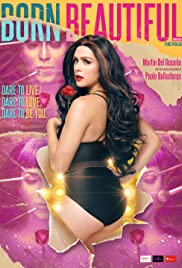
BORN BEAUTIFUL
Philippines, 2019, 96 minutes, Colour.
Martin Del Rosario, Paolo Ballesteros, Lou Velos, Chai Conacier, Kiko Matos, Akihiro Blanco.
Directed by Perci M. Intalan.
Sexual identity, issues of gender, issues of sexual orientation, an emphasis on gay themes, have been significant in the Filipino film industry. These themes are quite a preoccupation with many of the writers and directors in the industry. There has been an emphasis on transgender, the police and drag queens, a revelling in camp style.
This is a sequel to the 2016 Die Beautiful, a group of friends, one of whom dies. She appears in this sequel but dies again. In this film, the focus is on Barbs (Martin Del Rosario), a former queen in the local pageant, encouraging the group of friends, supervised by a veteran drag queen who manages a business for preparing the dead for burial, specialising in making the dead look like local or, especially, Hollywood stars.
Barbs has a boyfriend, Greg, who is married, stands her up at the parade and later comes insisting on the relationship. In the meantime, at the pageant procession, she is eyed by Michelangelo, begins a relationship with him, but he also has a wife whom Barbs meets and seems to be compliant about the relationship. Later, there will be dispute about the two boyfriends, Barbs going into another competition, the competition always having some kind of personal question, and she failing to answer in time about what love means to her.
In the meantime, Barbs has a change of heart, is influenced by a pamphlet about conversion therapy, goes back to being Bobby and participating in the therapy with several gay men. The leaders claim to be the equivalent of a church but audiences instantly realise that the two leaders are repressed gay men who eventually assault Bobby. In the meantime, as a test of his masculinity, he has an encounter with a prostitute.
Bobby, disillusioned, returns to being Barb and, in the midst of the dispute with the two boyfriends, the prostitute comes to say that she is pregnant and that Bobby is the father. Bobby is in denial, the young woman arguing her case.
The immediate solution seems to be an abortion but Barb screams each time the process begins and eventually persuades the young woman not to have the abortion, being willing to care for the child. However, the visit to the doctor indicates that her condition is an experience of gas.
The film was continued in the 12 part television series of the same name with all the same characters and going over some of the themes.
Published in Movie Reviews
Published in
Movie Reviews
Saturday, 09 October 2021 13:02
De Plus Belle/ Ladies
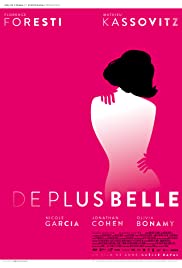
DE PLUS BELLE/LADIES
France, 2017, 100 minutes, Colour.
Florence Foresti, Mathieu Kassovitz, Nicole Garcia, Jonathan Cohen, Olivia Bonamy, Josee Drevon, Jeanne Astier.
Directed by Anne- Gaelle Daval.
This is a film which was written and directed by Anne-Gaelle? Daval, a female perspective on the story of a middle-aged woman who has had cancer surgery, who is in recuperation, is having to face herself and the consequences of the cancer, gradually coming out of herself, but the possibility and then the reality of recurrence.
It is a film which women can immediately identify with. The male audience is invited to be sympathetic and observing and learning.
Florence Foresti is striking as Lucie, the middle-aged woman, looking forlorn, wearing her wigs, adrift in a nightclub, approached by a presentable man, Clovis, Mathiue Kassovitz. He enters into her life, offering her some affirmation while questioning her about her attitudes. On the other hand, while she is supported by her doctor, she has to deal with her sister but, more especially, her mother who is not particularly supportive. And she has a teenage daughter who has a will of her own.
The important character is played by Nicole Garcia, Dalila, who services women like Lucie with a range of wigs as well as advice on make up. She also has a group of women, different ages, different sizes, leading them in exercise and dance movements, getting them to affirm themselves that they are beautiful, preparing them for a performance, dance, striptease, getting the women to acknowledge themselves and their bodies.
While Lucie does come out of herself, she does now have some strength in order to face the recurrence of the cancer.
1. A film by women for a women’s audience? For older women?
2. The French city, homes, streets, hospitals, shops, the nightclub, the dance hall, the concert? The musical score, especially for the performance?
3. Lucie’s story, her age and appearance, the experience of cancer, her relationship with her daughter, her relationship with her mother, sister? Working at the cemetery, with the flowers, the shop? After cancer, her gaunt appearance, her wigs, self-consciousness? The visit to the doctor, the discussions, the possibility of recurrence? Her being urged to go out? At the club, people dancing, her self-consciousness? Clovis and his approach, her putting him off?
4. Lucie going into the shop, Dalila, the wigs, her friendship and concern, her advice, taking her upstairs, the class, the range of women, age, size, exercise, dance steps, Lucie remaining with the group, the rehearsals? The plan, dancing, the performance? Self-affirmation that they were beautiful? The plan for the concert, the striptease, the episodes of stripping, the two men joining the group? The women and their sense of freedom?
5. Lucie and Clovis, the encounters, his taking her to the old people’s home, his charm with them, care for them, the conversations, Lucie enjoying the experience? On the back of the motorbike, the helmet, her going to return the helmet, his being with the girl? His character, affirming people, yet his own life and world? Bringing Lucie out of herself, the conversations, asking her questions? His presence at the performance? Her removing her wig, her baldness? His going to the hospital, accompanying her?
6. Lucie and the recurrence of the cancer, the discussions with the doctor, removing her breasts, replacements and the conversation as to the modelling? Her supporting her daughter? Picking at the bus stop, bringing her to the performance? The other women, Dalila, the support, the dancing, the strip?
7. Lucie and her mother, reflections on the past, her mother saying she saw her husband in Lucie? Trying to persuade the mother to give full consideration to Lucie?
8. Her sister, her husband, fidelity and infidelity?
9. A portrait of a middle-aged woman, her experience of cancer, coming out of herself, self-affirmation, relationships, the recurrence and the surgery – her future?
Published in Movie Reviews
Published in
Movie Reviews
Saturday, 09 October 2021 13:02
Island of Dr Moreau, The/ 1996
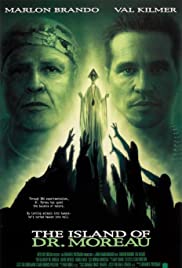
THE ISLAND OF DR MOREAU
US, 1996, 96 minutes, Colour.
Marlon Brando, Val Kilmer, David Thewliss, Temuera Morrison, Fairuza Balk, Daniel Rigney, Ron Perlman.
Directed by John Frankenheimer.
Charles Laughton in the 30s, Burt Lancaster in the 70s have played the mad scientist who is `playing God' with genetic experiments combining humans and animals. Now we have Marlon Brando, huge, dilettante English accent, carrying on like the pope of his island (with popemobile), pasty make-up, really making a spectacle of himself. Val Kilmer gives rather listless support.
The film was planned by director, Richard Stanley, who wrote the screenplay. However, he was fired within a week and replaced by John Frankenheimer. Several of the cast had personal difficulties, especially concerning divorce and the suicide of Marlon Brando’s daughter, early in the production and Brando withdrawing. Stanley made a number of documentaries including one about the making of this film.
The film is carried by David Thewliss (Naked), who does his best. An assorted international cast (including Ron Perlman, Temuera Morison, Fairuza Balk) play the mutants. The Queensland locations have atmosphere and the action combines with allegory about science and human dignity. But it is a might have been film.
1. The difficulties in production, change of director, cast? Difficulties with the performers? The failure of the film at the box office?
2. The popularity of HG Wells’ story, the 1930s version, the 1970s? The plot but its being updated to the late 20th century? The island, Dr Moreau, Montgomery assisting him, the range of humans, the range of mutants? Experiments, the use of technology?
3. The island, the settings, the jungle, the laboratory for experimentation? The sea? The musical score?
4. The focus on Edward Douglas, UN negotiator, the plane crash, the Java Sea, the rescue, his being taken to the island? Accommodation, information, observation?
5. The focus on Montgomery, his place on the island, his working with Dr Moreau, his personality, the encounter with Edward Douglas?
6. Marlon Brando as Dr Moreau, the touch of the absurd, his appearance and size, being carried with pomp, his manner of speaking? Credible as HG wells character?
7. The range of mutants, the cast performing them, appearance, behaviour, the mixture of human and animal? The experiments? The relationship with Moreau, his son? The sequences in the laboratory, the rabbits, eating them, Moreau not wanting death?
8. Edward Douglas, the effect of the experience, the attempts to escape, prevented, the building up to a confrontation and crisis?
9. The Sayer of the Law? His role, supporting Moreau? Philosophy, morality?
10. Douglas and his observing, the conference with Montgomery and Moreau? The birth of the hybrid? The explanation about DNA, Moreau and his motivations?
11. The growing unrest, the mutants, their rising up? Azzazello and the death? The repercussions?
12. The buildup to the confrontation with Moreau, his death? Azzazello and his killing Montgomery?
13. Edward Douglas, with the mutants, the buildup of dangers, the Sayer of the Law, his being guided – and his escape?
14. The 20th century interpretation of the classic novel?
Published in Movie Reviews
Published in
Movie Reviews